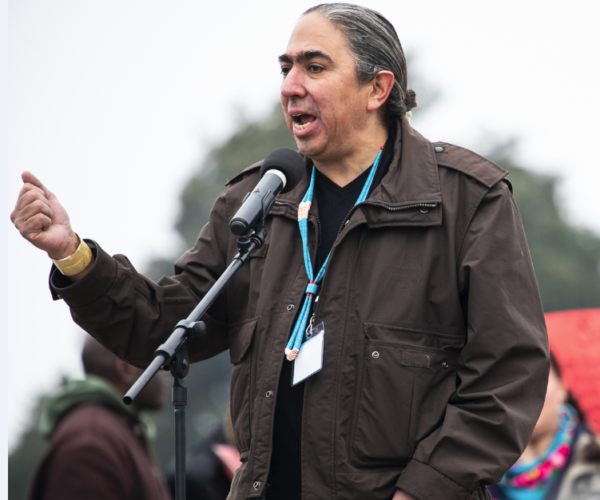
- Details
- By Native News Online Staff
GRAND RAPIDS, Mich. — Mark Charles (Navajo), who is running for president of the United States as an independent, will make two campaign stop in West Michigan on Thursday, March 5.
Grand Valley State University – Thursday, March 5, 2020 – 12:30 p.m.
He will speak at the Michigan Indian Education Council’s 2020 Native American Critical Issues Conference at 12:30 p.m. at Grand Valley State University Eberhard Center, 401 Fulton, Grand Rapids, Michigan.
Note Change of Venue
LINC UP – Thursday, March 5, 2020 – 6 – 8 p.m.
Charles will hold a meet and greet at LINC UP in Grand Rapids, Michigan on Thursday, March 5th, from 6-8 p.m. The event will take place at LINC UP, 1167 Madison Ave, S.E., Grand Rapids in the Gallery Room.
The Meet and Greet will be an opportunity for area voters to meet Mark personally, and to learn about his platform and policy positions. The campaign will also be raising funds at this event for our continued travel, staffing, and operational costs.
Author of the book Unsettling Truths: The Ongoing, Dehumanizing Legacy of the Doctrine of Discovery, Charles is also a public speaker, Native American activist and blogger. A graduate of UCLA, Charles spoke at Calvin University’s 2017 January Series.
Charles is running to build a nation where, for the first time, ‘We the People’ truly means ‘All the People.’
For those interested in joining the campaign, there will also be training offered on how to collect signatures for Charles, as he is currently collecting signatures to get on the ballot in Michigan.
More Stories Like This
Native News Weekly (August 25, 2024): D.C. BriefsCadiz, Inc. Announces EPA Selection of Mojave Groundwater Bank Northern Pipeline Project for WIFIA Loan Application
Jesse Jackson, Who Bridged Civil Rights Struggles for Blacks and Native Americans, Dies at 84
SAVE THE DATE: GVSU’s “Celebrating All Walks of Life” Powwow Set for April 4th
Monday Morning: (February 16, 2026): Articles You May Have Missed This Past Weekend
Help us defend tribal sovereignty.
At Native News Online, our mission is rooted in telling the stories that strengthen sovereignty and uplift Indigenous voices — not just at year’s end, but every single day.
Because of your generosity last year, we were able to keep our reporters on the ground in tribal communities, at national gatherings and in the halls of Congress — covering the issues that matter most to Indian Country: sovereignty, culture, education, health and economic opportunity.
That support sustained us through a tough year in 2025. Now, as we look to the year ahead, we need your help right now to ensure warrior journalism remains strong — reporting that defends tribal sovereignty, amplifies Native truth, and holds power accountable.
 The stakes couldn't be higher. Your support keeps Native voices heard, Native stories told and Native sovereignty defended.
The stakes couldn't be higher. Your support keeps Native voices heard, Native stories told and Native sovereignty defended.
Stand with Warrior Journalism today.
Levi Rickert (Potawatomi), Editor & Publisher

